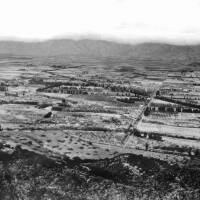L.A.'s New Urban Farm Initiative Struggles to Sow its Seeds

Los Angeles is offering landowners financial incentives to turn their urban property into green spaces. Unfortunately, nobody has applied yet.
The program is part of the Urban Agriculture Incentive Zone Act (AB 551), which offers tax cuts to landowners who promise to use their property for urban gardens and agriculture for at least five years. San Francisco was the first city to sign on when the bill was passed in 2014 and Los Angeles County followed earlier this year. The City of Los Angeles will be taking applications in August.
While the thought of luscious greenery and locally grown food sounds great, the program has had a slow start.
“We haven't had a single contract come through,” says Bruce Durbin, Supervising Planner at Los Angeles County Department of Regional Planning.
Durbin says finding landowners and farmers who are interested in participating is a big part of the battle.
“In many cases, we need a matchmaker like a community organization or church to connect us with someone who is interested in farming,” says Durbin who adds that the Los Angeles Food Policy Council is working with the Los Angeles Department of Regional Planning to make those connections.
Qualification has also set accessibility low to accommodate the unique urban landscape of Los Angeles. Each parcel has to be located in an unincorporated space and must be between .1 to 3 acres. The Los Angeles Department of Regional Planning estimates that 8,600 parcels are eligible for the program. Only a fraction seemed suited for agriculture.
KCET reviewed a random sample of 30 parcels and found that less than a quarter would be viable for urban gardens. A few had already been developed for other uses, and at least eight were sandwiched between houses and lacked easy access. Some were on freeways or parking lots.
The Los Angeles Food Policy Council maintains a database of prospective growers and landowners to help connect interested parties.

street in Manhattan Beach. | Marie Targonski-O'Brien
“We are also partnering with the Sustainable Law Center to connect growers and landowners with legal consult to develop contracts between the two parties in an effort to protect the interests of both parties,” says Taylor Henry, Summer Policy Fellow at the Los Angeles Food Policy Council.
Urban gardening includes traditional activities like food and flower cultivation but the program also allows composting, beekeeping, hydroponics and aquaponics. While that leaves room for growers and landowners to explore different options, it is ultimately the individual growers responsibility to determine whether a space can support these activities.
“This creates opportunity for a variety of activities that may not necessarily look like a typical three-acre garden, but can provide similar community benefits,” says Henry.
Cyndi Hubach, manager and owner of Elysian Valley Community Garden, started a garden on her vacant property back in 2011. While Hubach says her decision to start her garden wasn’t a financial investment, it has saved her thousands annually thanks to tax incentives.

residential street in Manhattan Beach. | Marie Targonski-O'Brien
“You’re not going to change someone from being a developer. I don’t think this program would change anyone's mind, unless they have other things motivating them, like I did,” says Hubach who believes the program is a good option for landowners who don’t want to deal with property maintenance on their vacant lots. “For people who plan to let their lots sit vacant with overgrown weeds. It’s a nuisance. You get a notice from the fire department and then you get fine. It’s a no brainer.”
While Hubach felt a deeper calling to develop a garden on her land because of her history as an environmentalist, some argue that the city should be prioritizing developing affordable housing, rather than promoting the preservation of green space.
“I recognize that there is a severe affordable housing shortage but I hate to see these two issues pitted against each other,” Hubach said. “No one wants to live in a city that’s wall to wall houses. We need a balance of housing and green space. It’s not good for public health. It’s not good for physical health.”
For now, Hubach hopes the city can see some of the benefits she’s gotten from her garden.
“It’s really the best thing I’ve ever done,” Hubach said. “We’ve got this beautiful green space and it’s teeming with life. If people did it they would see they get a lot more from this than from building a development.”
Update:
In a statement to KCET Camille de la Vega, Communications and Public Engagement Associate of Los Angeles Food Policy Council, noted there have been 75 individual requests from residents and landowners interested in the city program. They will be able to apply beginning in August.





